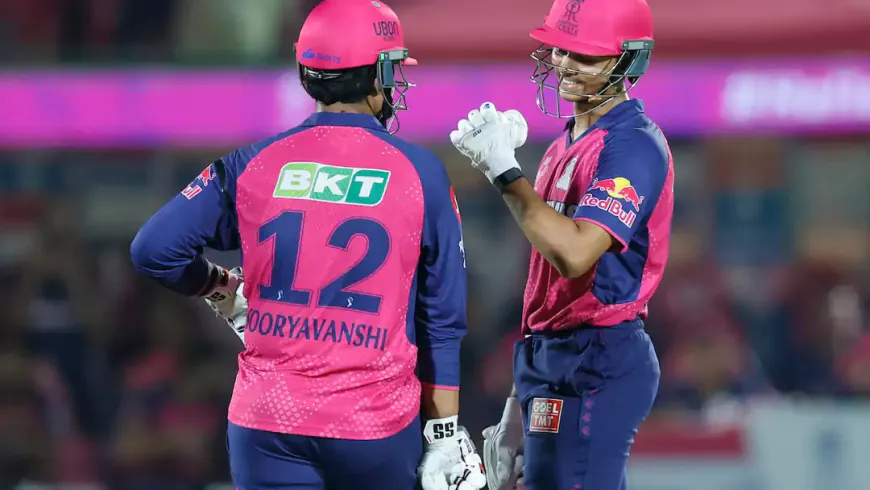Jaiswal and Suryavanshi’s Power Start Breaks Gujarat’s Rhythm
Yashasvi Jaiswal and Vaibhav Suryavanshi's 14-year-old firecracker stand of 166 runs created a new IPL record as Rajasthan Royals coasted to an easy chase against Gujarat Titans.

The game between Rajasthan Royals and Gujarat Titans turned into a high-scoring show that left bowlers with very little to smile about. But what stood out the most was how young openers Yashasvi Jaiswal and Vaibhav Suryavanshi completely changed the course of the match with a powerful opening stand. They put on 166 runs in less than 12 overs which ruined Gujarat Titans' strategy from the very beginning. Rajasthan Royals emerged to chase with purpose and took it so effortlessly. Their first two batsmen were aggressive right from the word go and did not let their foot off the gas even for a moment throughout the innings. Gujarat's bowlers who banked on tight short-pitched stuff just couldn't get going this time.
Prior to this game Gujarat boasted a solid bowling attack particularly while employing short balls. Mohammed Siraj and Prasidh Krishna were major contributors to such a strategy. They had been successful in previous games by employing hard lengths as well as short balls. With their combined work, they gained 15 wickets employing the same strategy as well as enjoyed a good economy rate. Prasidh especially had been quite effective with an impeccable dot-ball percentage and poor economy. But against Suryavanshi and Jaiswal none of this paid off in any way. The Rajasthan openers came at them with aggression from the word go and the scoring rate continued at a rapid pace. Gujarat's bowlers attempted to stick to short lengths but the batsmen seemed primed and smacked nearly everything pitched up at them.
The initial overs saw Siraj and Ishant Sharma bowl 23 short or short of good length balls. Before anyone could even blink Rajasthan had reached 60. Even Washington Sundar, who bowled flat off-breakers, was torn apart. Prasidh did manage to stem the flow for a short moment in the powerplay but that was the only hush-hush moment in Rajasthan's run chase. From there on it was power hitting and intelligent placing. Rajasthan's powerplay run rate was already the highest in the tournament before the match and they proved just why. Their previous game against RCB had also witnessed them scoring 72 runs in the first six overs. That match gave a clear indication about how destructive this pair would be at the beginning of an innings.
Jaiswal had worked on his game against short balls this season compared to the previous one. In 2024, he was dismissed six times by such balls but maintained a decent strike rate. This year he had scored over 100 runs on short balls with just two dismissals and an even better strike rate. Suryavanshi had also been solid in the previous two matches tackling short balls with confidence. Together as a team here they made 123 runs from only 48 balls against pace which demonstrated their complete control. Gujarat bowlers surprisingly didn't attempt full deliveries enough. There were just five full pace balls and one yorker dismissed Suryavanshi when the majority of the destruction had already occurred. The majority of the other full balls resulted in boundaries.
Rajasthan had a trend of beginning well but not being able to complete matches. In one of their initial home games they required only 25 runs off 18 balls with eight wickets remaining but still lost. Avesh Khan bowled yorkers towards the end and turned that match around. On that day Jaiswal was dismissed to a flawless yorker and Avesh employed the same trick once again to take three wickets in his last overs. Mitchell Starc had done the same two days prior to that match. If Gujarat had used a similar death-bowling tactic early on perhaps the pressure would have caused Rajasthan to stumble once again. But it didn't occur and now Gujarat's playoff hopes look fragile.
In their previous matches Gujarat had actually faltered when they overused the short ball. Against Punjab Kings they bowled short 43 percent and gave away plenty of runs. In another match against Lucknow Super Giants Aiden Markram hit plenty of boundaries off similar balls. The trend is obvious. Gujarat's short-ball strategy does not pay off as long as the batters are prepared. Against attacking batters like Jaiswal and Suryavanshi it can fall apart very quickly. The statistics also indicate a dramatic contrast between Gujarat's performance in win and losing situations while employing short balls.
Ultimately it was a one-sided pursuit with Rajasthan wrapping up the victory without requiring all their firepower. The opening stand did most of the work and left Gujarat's bowling plan in shambles. This game will certainly be a lesson for the Titans as they try to modify their strategies in the remaining games.



 admin
admin